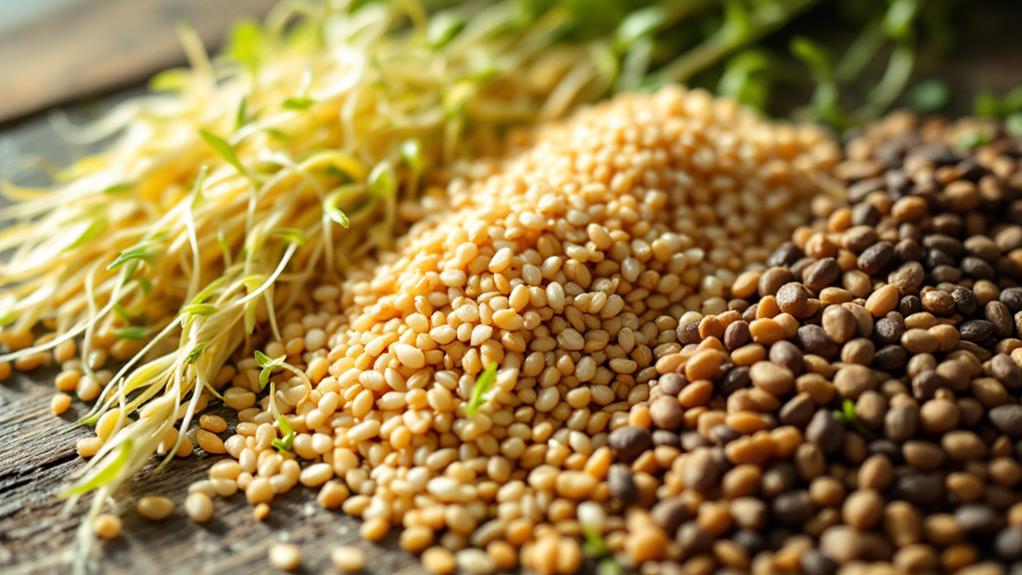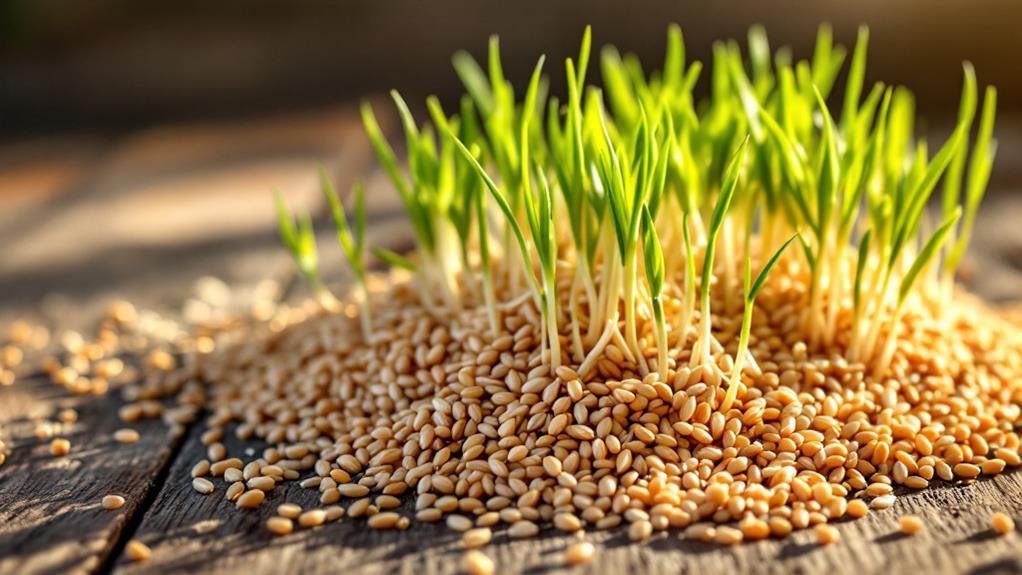Everything You Need to Know About Sprouted Grains: Health Benefits and Uses

Sprouted grains are a nutritious alternative to regular grains, offering higher vitamin and mineral content. The germination process improves digestibility by breaking down starches and proteins, leading to better absorption of nutrients. With reduced antinutrients like phytic acid, sprouted grains are also easier on your digestive system. They contain essential amino acids and increased fiber, which can support weight management and stabilize energy levels. You'll find these versatile grains adding flavor to salads, breads, and snacks. When purchasing, choose fresh, organic options for maximum benefits. Investigate the full benefits and culinary potential of sprouted grains for a healthier lifestyle.
Understanding Sprouted Grains
Sprouted grains are a nutritional powerhouse, offering improved digestibility and nutrient absorption compared to their unsprouted counterparts. By allowing grains to begin the germination process, you reveal a host of health benefits. Soaking grains in water initiates this transformation, typically over 1-3 days, depending on the grain. During germination, enzymes become active, breaking down starches and proteins into simpler forms like simple sugars and crucial amino acids. This not only improves digestibility but also increases the availability of key vitamins and minerals.
One of the key advantages of sprouted grains is the significant reduction of antinutrients such as phytic acid. These compounds often hinder nutrient absorption, but sprouting effectively minimizes their presence, making nutrients more bioavailable. As a result, you can enjoy an increase in the nutritional value of these grains, which are now richer in antioxidants and other beneficial compounds.
Incorporating sprouted grains into your diet can be both delicious and versatile. They're perfect for a variety of culinary applications, including baking, cooking, and as ingredients in snacks, cereals, and energy bars. This guarantees you benefit from their improved flavor and nutrition, all while expanding your culinary repertoire.
Nutritional Advantages
The nutritional benefits of sprouted grains are undeniable, offering you an excellent source of improved vitamins and minerals. Through the germination process, sprouted grains improve their nutritional advantages by increasing vitamin levels, especially B vitamins like folate and riboflavin. You'll find that these grains contain a higher concentration of crucial nutrients, making them a more nutritious choice than unsprouted varieties.
One of the standout features of sprouted grains is their improved digestibility. The germination process reduces antinutrients such as phytic acid, which means your body can absorb minerals like iron, zinc, and magnesium more efficiently. This makes sprouted grains a great option if you're looking to optimize the absorption of minerals from your diet.
Furthermore, these grains are rich in vital amino acids, including GABA, improving the comprehensive protein quality. This can be particularly beneficial for your health and wellness path. The increased fiber content in sprouted grains contributes to better digestive health and may support weight management. Plus, their lower glycemic index means they won't cause rapid spikes in blood sugar levels, helping maintain stable energy levels throughout the day. Enjoy the nutritional advantages of sprouted grains and improve your diet.
Health Impacts

When you incorporate sprouted grains into your diet, you're not just enjoying a tasty meal but also reaping significant health benefits. These grains boast a superior nutritional profile, offering higher levels of vital vitamins like folate. This increase in vitamins and minerals, including iron and magnesium, is thanks to the germination process, which improves nutrient content and digestibility. Sprouted grains enhance mineral absorption by reducing antinutrients, such as phytates, by up to 81%, making nutrients more bioavailable to your body.
Furthermore, sprouted grains can play a significant role in blood sugar control. With their lower glycemic indices, they help maintain better glycemic responses, which is particularly beneficial if you're managing pre-diabetes or type 2 diabetes. Research highlights that sprouted brown rice can lead to improved fasting blood glucose and serum cholesterol levels, promoting overall metabolic health.
The rich dietary fiber content in sprouted grains supports digestive health, helping you feel fuller longer and potentially aiding in weight management. By choosing sprouted grains, you're not only improving your diet's nutritional value but also supporting your body's health impacts in multiple ways.
Culinary Applications
Incorporating sprouted grains into your meals brings a delightful mix of flavor and nutrition to your culinary repertoire. These versatile grains can transform your dishes, regardless of you're tossing them into salads or using them as a base for grain bowls. Their improved nutritional value adds fiber and protein, turning ordinary meals into satisfying feasts.
When it comes to baking, sprouted grains take your breads, pastries, and granola to the next level. They offer better texture and a subtle, natural sweetness that can raise your baked goods. Imagine a loaf of bread that's not only delicious but also packed with nutrients—thanks to these grains.
For breakfast, sprouted grains in cereals provide a hearty start to your day. They amplify the meal's nutritional value, ensuring you're energized and ready to tackle whatever comes your way. And if you're looking for healthy snacks, consider energy bars or chips made with these grains. They're not just convenient; they're also easier to digest.
Don't overlook sprouted lentil flour in your recipes. It improves flavor and nutritional content, making it an excellent choice for creative cooking. So, investigate these culinary applications and enjoy the benefits sprouted grains bring to your kitchen.
Purchasing Tips

Exploring the culinary potential of sprouted grains is only part of the expedition; making informed purchases guarantees you get the most from these nutritious powerhouses. When shopping, prioritize products located in the refrigerated or frozen sections. These options maintain freshness and often avoid the preservatives found in non-refrigerated items. To ascertain you're truly benefiting from the sprouted grains, check the ingredients list carefully. Some products might only contain a minimal amount of sprouted ingredients, diluting their nutritional benefits.
Look for certified organic labels, like those from One Degree, to confirm that the grains are grown without harmful pesticides and chemicals. Certified organic products not only offer health benefits but also contribute to a more sustainable environment. Keep in mind that sprouted grain products typically have a shorter shelf life. So, consider the purchase date and plan to use them promptly to optimize their nutritional value.




